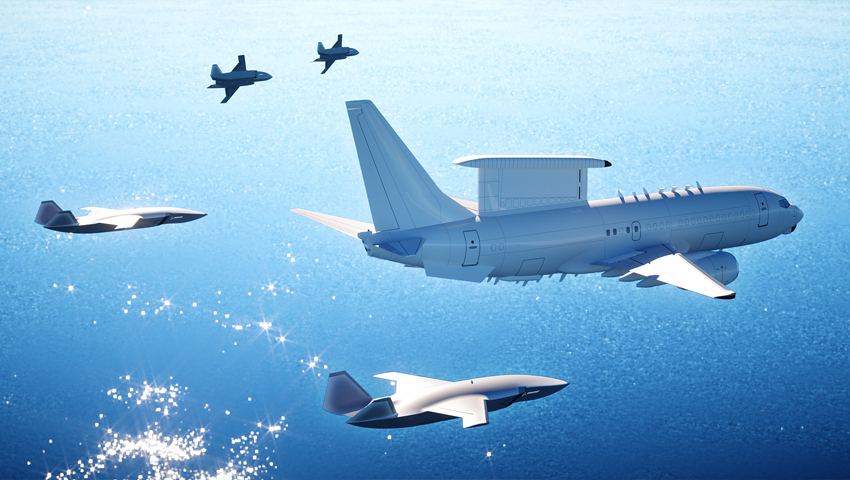Defence Minister Christopher Pyne and Defence Industry Minister Steven Ciobo have announced a major step-change for Australia’s air combat and defence industrial capabilities with the unveiling of the Boeing Airpower Teaming System.
To continue reading the rest of this article, please log in.
Create free account to get unlimited news articles and more!
Designed for global defence customers by Boeing Australia, it is the company’s largest investment in a new unmanned aircraft program outside the US. The aircraft will complement and extend airborne missions through smart teaming with existing military aircraft.
A model of the Boeing Airpower Teaming System was unveiled at the Australian International Airshow by Minister Pyne and Australia’s Chief of Air Force, Air Marshal Leo Davies, AO, CSC. As a research and development activity, the Australian government and Boeing will produce a concept demonstrator called the Loyal Wingman – Advanced Development Program that will provide key learnings toward the production of the Boeing Airpower Teaming System.
Ministers Pyne and Ciobo said the research and development opportunity was a further demonstration of the Australian government’s collaborative and maturing relationship with Australia’s defence industry as well as international recognition of the nation's strength and capabilities.
"The partnership will produce a concept demonstrator of a low cost, unmanned ‘Loyal Wingman’ aircraft, capable of operating in concert with Air Force’s fifth-generation air combat capability," Minister Pyne said.
Minister Pyne said this was a major milestone for Australia's agenda to develop a competitive and sustainable defence industry, with high-end industrial, manufacturing, research and development capabilities.
"This will be Boeing’s first unmanned aircraft designed and engineered in Australia and represents the company’s largest investment of its kind outside of the United States," he said.
The Boeing Airpower Teaming System is expected to:
- Provide fighter-like performance, measuring 38-feet long (11.7 metres) and able to fly more than 2,000 nautical miles;
- Integrate sensor packages onboard to support intelligence, surveillance and reconnaissance missions and electronic warfare; and
- Use artificial intelligence to fly independently or in support of manned aircraft while maintaining safe distance between other aircraft.
Marc Allen, president of Boeing International, welcomed the announcement, saying, "This aircraft is a historic endeavour for Boeing. Not only is it developed outside the United States, it is also designed so that our global customers can integrate local content to meet their country-specific requirements."
These comments were echoed by Kristin Robertson, vice president and general manager for Boeing's autonomous systems division, who said, "The Boeing Airpower Teaming System will provide a disruptive advantage for allied forces’ manned/unmanned missions.
"With its ability to reconfigure quickly and perform different types of missions in tandem with other aircraft, our newest addition to Boeing’s portfolio will truly be a force multiplier as it protects and projects air power."
Minister Ciobo said that Boeing will seek to team with large, medium and small Australian businesses and partner with research organisations, including universities and the Defence Science and Technology Group.
"The development and demonstration of this air vehicle will create around 100 new high-technology jobs in aerospace engineering and design in Australia, as well as wider job opportunities across the supply chain," Minister Ciobo said.
"This proposal could lead to another exciting step forward in Australia’s defence export strategy and provide our allies with critical capabilities based on Australian ingenuity."
Defence will invest around $10 million per year, up to $40 million, to evolve development of this concept.
More to come.

 Login
Login







